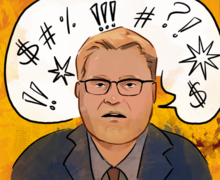City : Lost art: County budget leaves future of art program funding in jeopardy
A budget vote marked by partisan conflict and confusion ended with substantial cuts to arts and cultural funding Tuesday.
The Onondaga County Ways and Means Committee approved a $1.15 billion budget, which lawmakers say will prevent a major spike in county property taxes in 2011.
Legislators approved the budget 15-3 at 10 p.m. on Tuesday after nearly six hours of deliberation and caucusing. County Executive Joanie Mahoney, who has publicly spoken out against the committee’s budget changes, can veto any portion of the budget, but 13 votes from the legislature can override her veto.
Among the budget changes, the legislature agreed not to sell Air 1, the sheriff department’s helicopter, and reinstated funding to restore the Landmark Theatre and two employee positions at Pratt’s Falls County Park.
The arts did not fair as well in county funding, though a private trust may fill the void.
The legislature voted 12-6 to strike down a resolution to increase funding for 16 arts and cultural organizations and restore funding to nine, which were eliminated. The cuts total $387,000 and made up one-tenth of 1 percent of the budget.
The vote followed a heated exchange across the aisle as democratic legislatures touted the economic and intangible benefits of the arts, and Republicans stressed the sky-high property tax increases and subsequent need for cuts.
‘We are cutting and slashing not only the heart and soul of our community, but one of the most important economic development tools we have,’ said county legislator Tom Buckel (D-7th District) in support of the arts.
But the legislature is not leaving the arts out to dry. The aim is to shift funding from the county to the Cultural Resources Trust, a fund created by the county in fall 2009, which operates independently. The trust was not initially developed to fund day-to-day operations, but to assist cultural, educational and historical institutions with special projects.
That would change next year.
‘The fact is we’re looking at a 100 percent tax increase, and we have to start looking at things with new eyes and being a little bit more creative than we have in the past,’ said legislator Kathleen Rapp (R-5th District). ‘Is this a conventional solution? Probably not, but the money’s there.’
The Cultural Resources Trust has helped the Syracuse Symphony Orchestra, Syracuse Jazz Festival and Syracuse City Ballet in the past. But democratic legislators were less concerned with the trust’s track record and more about the legality of the trust and the assurance that it would cover the nearly $400,000 in cuts.
‘We’re on awful thin ice here saying, ‘Yeah, go ahead and fund these places,’ when in fact we don’t have the right or the law behind us to tell them to do so,’ said Sam Laguzza (D-6th District).
The Cultural Resources Trust bylaws do not mandate the trust appropriate funds based on the legislature’s suggestions, but County Executive Mahoney sent a letter to the chairman of the fund Tuesday.
‘It’s dangerous. There’s no certainty they’ll be funded. We’re told in conversations with the chairman that the money’s there, but how much which organizations would get, we don’t know,’ said Martin Masterpole (D-17th District).
Reaction from local arts organizations was somber.
‘The larger concern to us is the message that this sends,’ said Jeff Woodward, managing director of Syracuse Stage, which lost $25,000 in county funding. ‘The fact that the county feels that arts and culture, and particularly Syracuse Stage, is not worthy of any public funding at all, that greatly troubles us.’
Last year, the county cut about 20 percent of Syracuse Stage’s budget. The concern, Woodward said, is that it becomes a ‘slippery slope’ and keeps falling.
Gregg Tripoli is the executive director of the Onondaga Historical Association, which lost $11,000 in funding this year, 10 percent of its budget.
‘We’re proving a real service to the county,’ he said. ‘And the county is paying a smaller and smaller cost.’
The nature of the museum’s function — collecting, preserving and archiving the county’s history — makes cutbacks particularly difficult, he said.
‘We cannot be that discretionary because we have no control over the history made or brought to us every day,’ Tripoli said. ‘We can’t reduce our sets or book fewer performances. We don’t have the luxury of saying no to a historically significant painting. Something is always coming in a manila envelope or a box-load from grandma’s attic,’ he said.
The Cultural Resources Council lost $60,000, all of its originally appropriated funds.
The burgeoning art community brought the council’s Executive Director Stephen Butler back to Syracuse.
Collectively the arts employ more than 1,000 people, making them the 17th largest employer in Central New York and a generator of about $70 million in revenue, Butler said.
‘During tough economic times, people need their art more than ever,’ Butler said. ‘Art is cathartic, and we’re really wired to engage in art — color, rhythm and movement. It’s just part of our humanity.’
Published on October 13, 2010 at 12:00 pm





